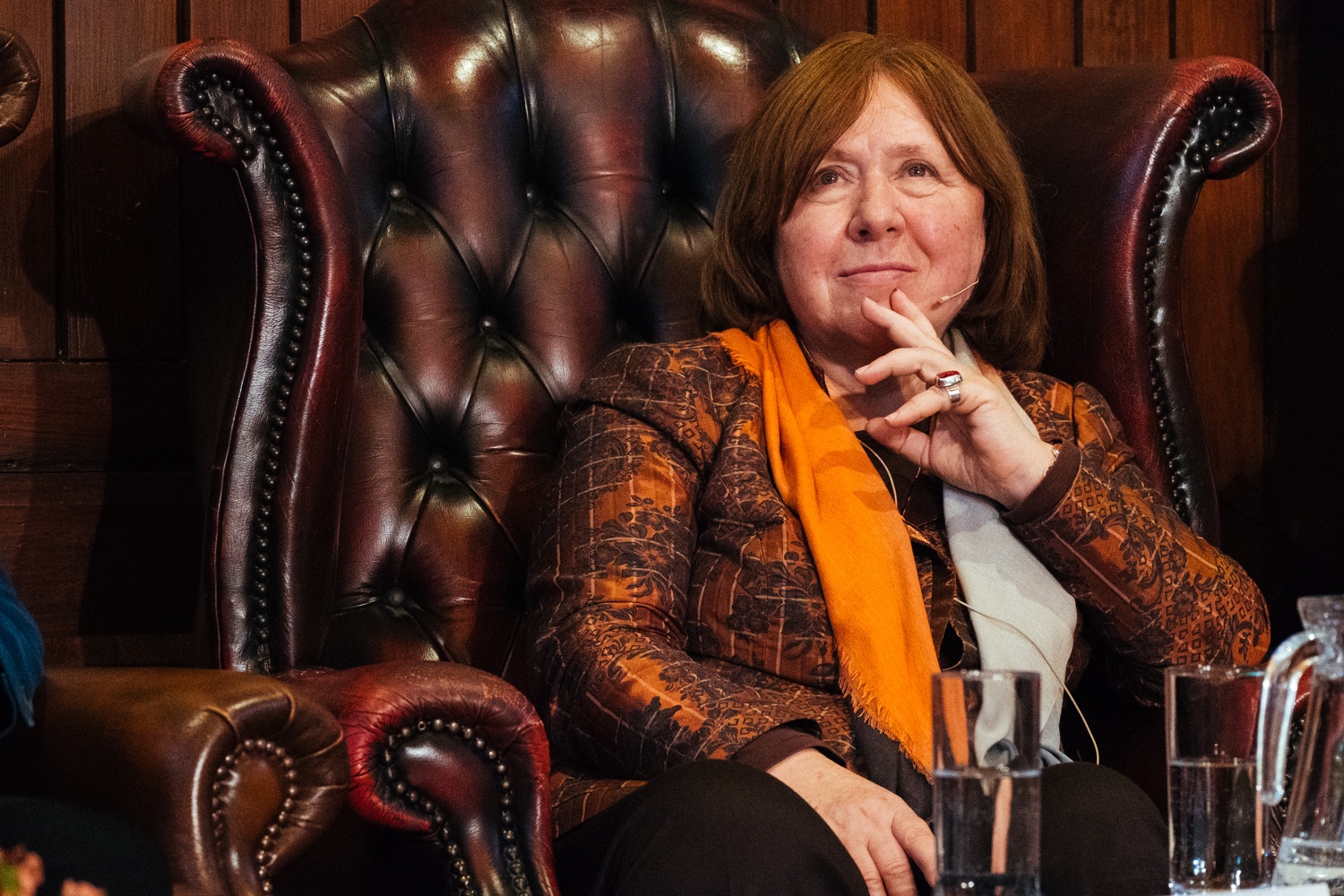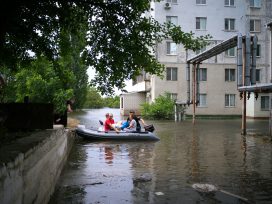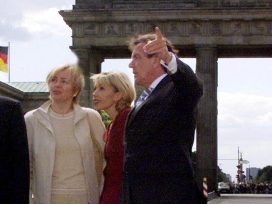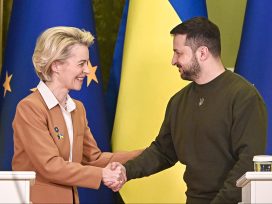[Seated in front of the camera] Which way do I look?
…
Life itself gives birth to all my themes. At first, as you know, it turned into several books. A history of that period of time, the Red time, when the idea mattered most of all. Everyone was infected with the idea, to a greater or lesser extent. Or, at least, they were curbed by it. But everyone depended on it and many believed sincerely in it. In the end, many lost faith. But the idea remained, like an unyielding inner core, a reinforcing steel bar. During this lifetime, the time when the idea ruled, various things happened. I selected the most overpowering, most dramatic events, ones that could shed a light on what kind of people we were. What we had been through. How we had been deceived by that utopian vision. And how, at first, we hadn’t understood but eventually began to understand. How we wouldn’t have been able to endure living in any other way than we did. It wouldn’t have worked for us. As I moved on, from one book to the next, something struck me. People talk about the war or about Chernobyl. But only rarely do people talk about happiness. A feeling grew on me that people didn’t talk about the things that really matter in human lives. And I’d look back over my own life. My childhood, for instance. My parents never spoke about happiness. About how you ought to be happy and grow up. How beautiful life is, how joyful it is when love comes to you. How you will have children but not only that, you will also find love. And that it is something so enigmatic, so interesting. But … all the talks we had were about death and the mother country. Talks about what is important about being human simply never happened. Later in life, it was just more of the same. Of course, people did fall in love and led their lives. But there never seemed to be … a philosophy of life. It was up to the individual to try every day to push ahead, and reach for the meaning of it all. This was neither seen as a philosophy for individuals nor for communities. Always, there was something that mattered more. That towered above human beings. A striving of some kind, a sacrifice of some kind. Which you must be prepared for, always. And when I had come to the end of that series of books – when utopia had been defeated, when we were all caught up in the rubble it left behind – I began to think that I wanted to write an account of who we are, in ourselves, but from a different point of view.
I wondered: what would be the core of a narrative like that? If, earlier on, the core had been Afghanistan or the war or Chernobyl – where would you find it now? I thought that it would probably be found among the things we never used to think about. Never, that is, until now, when private life has finally been resurrected. When, finally, money has taken on meaning, significance. Before, everyone was just as broke as everyone else. Money hadn’t meant anything in particular. Now, though, people had started to travel, to see the world. For them, a lot of questions had surfaced, they had found desires. If they wanted to, they could dive into a kind of vast ocean that was completely unknown to them. That’s to say, into private life. It offered another form of human meaningfulness than to go off and die somewhere. As it turned out, literature – Russian literature – was unable to help them because it has always been preoccupied with quite different things. With loftier and high-order ideas, that is. It always contains something ready to squash human life. Whatever higher order idea it is. And then I thought, of course, love is the most important, essential aspect of us; it, and the time when we are about to slip away. When we prepare ourselves for disappearing from this world. So, I thought, as a preliminary idea: Love and Death. Then I decided to go for that idea and began questioning people and asking them to tell me about their lives. Most importantly, to speak about love, whether it had been there or had not been found. It seems true that people are in one group or the other: either, they know what love is or they don’t know what love is. They may have had children or not, that doesn’t affect anything. So, for quite a long time … since five, six, seven years ago, thereabouts, I have been actively thinking about this. Meanwhile I record people as they talk. That is the time when you somehow get the hang of the material, and gradually get a feel for the book, a foretaste of the theme.

Soviet statue in Vilnius, Lithuania. Photo: Guillaume Speurt. Source: Flickr
You see … when I question somebody, I don’t interrogate her about ‘the war’. I ask her about her life and, when she tells me about life, she will of course, almost inevitably, say something about love. Quite often, she tells me about love. In my earlier books, love was after all not central, not in focus. Instead, it was some kind of event, like Chernobyl, that was the key to it. So love, as a thing in itself, was not the main theme. We have of course no idea of the many different emotions they went through at the time, or how it was for them. There, what went on was more about love demanding sacrifices. The women proved ready to make these sacrifices. So strong was their love.
Even so, the most important thing was the event – that monstrous event, Chernobyl, that is. Don’t you agree? But this time, the theme of love will be treated differently. When, for instance, I started reading the literary canon from that point of view, and also to look at our modern literature, the classics, what I saw was… I found that, in our literature, it deals with love least of all. For us, it’s like this: either, it’s all roses and mimosa – that kind of sentimentality. Or else, the hero goes off to somewhere, for the sake of his country, for some idea – like in Turgenev. And in Leo Tolstoy, too, when Vronsky goes off to fight in the war. Despite everything that goes on, not very much is said about just love. It’s true even for our language that, in it, the language of love is poorly developed. In our language, the language of love isn’t present in the same way as in French literature. French has got ten words to describe the state of a woman’s body after the act of love. Or, the movements of the beloved’s hands. Absolutely nothing like that exists for us. The actual courtship and the meeting, these things are there but, then, the very process of love … love itself … it’s seen as somehow ethereal. It is insubstantial. As the child put it when I asked: ‘What do you think love is all about?’ Well, no, actually, I asked ‘How did you come to be?’ So, the child said: ‘Mummy and daddy kissed and then I came along.’ Which is, more or less, how it goes in literature. I’ll aim to turn this space into something more habitable, to make people more ready to think of happiness as a kind of enormous expanse. Like a building, a house with many different small cupboards and tiny rooms, and to each one you need a special key. It takes your whole life to weave the spider’s web that is love and you have to be ready for it. It is exactly why I would like to introduce the theme into the world.
As I’ve been following up on that, I have – I’m sorry to say – come across big problems. It’s not just that love is not there in literature. I’ve also had problems because the new book must be written by a new person. Someone who has to think in another way and use another kind of vocabulary. Who is capable of another sense of emotional freedom, one that was not required of me in my earlier works. Then, the vocabulary was different. It was another, harder language. I have a feeling that this will grow into an exceptionally long journey. An exceptionally hard task.
On one hand: this is my way ahead, a stage in my travels. The journey is part of to my present intentions. On the other hand: ahead, there is an opportunity to speak about what is valuable in life – personally, I feel that all other words are drained of meaning. Should I once more travel to find the war, and then write about the war? And once more speak out about how senselessly people kill each other and what an insane occupation it is to murder another human being? That ideas should be killed, not people. That everyone should sit down at a table and talk together …? None of all that works any more. It is banal. I check the internet and read every day: ‘Today, thirty militiamen in the Russia-supporting militia have been killed and twenty soldiers in the Ukrainian army. And five civilians.’ That’s how the day begins. I don’t think it would help if I kept speaking about this. Because I believe that … love is what people miss most of all. Perhaps THIS is the language I would like to start speaking. Besides, nowadays, the situation is that society is hugely fragmented and people have become infected with anger. So, there is a lot of hatred around. I don’t think it is possible to conquer it with ordinary words, with ordinary arguments. Families split apart, everyone is angry about Ukraine. I know cases of children who were thrown out of their homes because they were against the annexation of Crimea. These are such terrible times.
The writer Oksana Zabuzhko recently published a book based on all the writings that were posted on the internet during the Maidan. I wrote in the book that all the dreadful things quoted in it – that people died and were ill-treated – can be turned either into hatred or into love. I wished they were used for love. Only love can save those who are infected with anger. I also wrote about Ukraine, what life is like in Crimea and some things against Putin’s policy. It was chilling to read Russian internet posts afterwards: they were cursing me. Not only me, though, but many others. Makarevich, Akunin and Ulitskaya, all those who had tried to say something against Putin. It was simply awful to see what was being said on the internet. It doesn’t take much before people really do come out in the streets and tear each other limb from limb. Such hatred everywhere. I think one should speak another language now. Not try to prove something. Perhaps one must be able to speak about childish things such as love. Yes, I can’t see any other language that will do. Nothing functions any more.
My two forthcoming books are completely different projects. The first one is a book about love. And next, the second one, which will be about death. Or, rather, let’s say it will be about those who are on their way towards death – the process is a long one. So, about how a person grows older, how her worldview changes, how her terms for relating to the world become somehow different. After all, science has given us twenty to thirty years of more life. How do we deal with that? We dream of immortality but, in the main, we don’t deal very well with these extra years. But one of my heroes once said to me that old age is interesting. My project is simply to follow the road to the end, together with people I have met in this life. Just follow them and somehow be allowed to see ALL of human life. From beginning to end.
I have always been writing my books, and a person doesn’t interest me just as someone who belongs in a particular time. I have always been interested in what I have called ‘the eternal man’ – in what is eternal in humanity. Now, what I want to do, because there are fewer books of this kind, is to examine our lives, not from a historical point of view, but from the outside. Let’s say, as if seen from the cosmos. That’s why, to me, animals, plants and people are so closely connected. That’s to say: everything alive. I would really want to achieve the way of seeing that I love in Albert Schweitzer. His reverence for life. When you regard a man, not as Ukrainian or Belarusian or whatever, but as someone with a living life. Which is something we often utterly fail to respect. As if we were totally immortal. As if we had no goal other than to fit in a Chernobyl somewhere. Or a Donetsk.
[A phone rings]
Hallo! Ljuda, I’m in the middle of a filming session. Bye for now, I’ll call you later. Bye.
Everything is connected after all: human beings, animals, birds, everything that’s alive, somehow. We completely ignore this. As if we were immortal. As if we had been brought into this world in order to realize some kind of utilitarian goal in the here and now. But we have actually been created for a quite different purpose.
Until later, the working title of my book about love is The Wondrous Deer of the Eternal Hunt. It is based on lines in a work by the Russian writer Aleksandr Grin. He was popular before the revolution. The elaborate title contains a kind of wistful Russian longing for love. The character of Russian people is very interesting. It always baffles me, even when everything seems normal. Even when things look good, a kind of melancholic longing always lurks somewhere.
That’s why people love trains – because you can stay sitting there, looking out through the window. And that’s why they love cars – because one can carry on travelling in them for a long time. I haven’t been able to find anything like this in other nationalities but it’s truly there in the Russians. Perhaps it is linked to the geography of such an enormous country. It’s really interesting, you know.
Hunting something … yes! It is an eternal hunt … a hunt for something special, something mankind has never managed to capture. It is of course naïve to believe that if you can just capture it and haul it along, then all the metaphysical rubbish, all these chunks of life … and then it will suddenly turn into a book, a work of art. Of course it’s a naïve delusion. In reality, it is a very subtle, slow and not especially like an animal predator at work. It requires huge spiritual efforts and much understanding, yes, very many abilities, especially of the literary and humane kind. It is a very complicated task. As for the genre I use, it exists in Russian literature and in Belarusian … there are books … the books are about the war, above all. When a vast number of people were afflicted and the feeling was that literally no one, not even a man or woman of genius, who would be able to get a grip on the enormity of it. What is the Second World War, really? It was of course a war so infinitely more all-encompassing than, for instance, the Napoleonic wars. And this was why people tried to collect all the new material. They sensed that this new material was not only to be found stored inside the brains of the elite or the celebrated war heroes. Because I grew up in a village, those who always interested me were not the heroes but the little people. I remember the old women in the village …
Goodness me, it was so madly interesting, all that … and they were such complex people, so sophisticated … and so very interesting. What these old ladies could tell me were things I had never read about in books. Take my paternal grandmother … she was one of them. And I wanted … my goal was simply… Everything that these people were telling me about and that no one had listened to. They were grains of sand in history. The important thing was of course to retain the fragments of true genius in them. Elements, which would otherwise disappear with their lives. All the stories that no one had cared about, and added up to a history of emotions. I wanted to conserve them. I understood that it must turn into one of these ‘novels of many voices’ – a polyphonic memory. That was why every book required five hundred, or even a thousand voices. It was a thousand for The Unwomanly Face of War. There were also very, very many for Chernobyl Prayer. And for Secondhand Time I also needed a really large number of people. One keeps searching, literally, for these tiny fragments – grains of gold, and creating a mosaic out of them.
How can you remember so much? [To Kajsa Öberg Lindsten, who translated during the interview]
There’s a comparison with being a sculptor – Rodin expressed it. If he was asked his approach to sculpting, he said: ‘I take a block of marble and set about removing the superfluous parts.’ This is such a … it’s a general principle. How, out of the chaos that is life, you chip away to extract certain images or certain structures. For him it was statues. For someone else, it might be a temple. But I have to create the structure out of words, just that construction.
Reality is so full of secrets. First, take time that is always slipping away. It is very difficult to catch everything, every time. Don’t you agree? Catch it and then find some kind of shape for it. It is important to realise that people often aren’t even aware of much of what is there inside their brains. Sometimes, when one brings out what is in people’s memories, they will say: ‘I didn’t even know that I knew that. I had forgotten it so completely. It wasn’t until you asked that I came to think of it …’ To learn something new, one must ask in new ways.
Today, I don’t feel that I’m being censored. The only possible censorship would be of a kind I’m unaware of, something I don’t know of. It’s the only constraint I feel. This is why music, painting and even philosophy are so important for me. As are some interesting books about science. All the human knowledge, it helps to know where to search and what to search for. In order to tear oneself away from banality. After all, we live surrounded by banality most of the time. One must tear oneself away from it.
In the beginning, I start out with certain intuitions about the book – that is, ideas. Ideas, which are rather general. ‘Women at war’, for instance, or ‘love’. These are very general ideas. Then I go through the material in depth. It amounts to an awful lot of interviews and the process can take quite a few years. Eventually, there are hundreds of interviews, it’s a chaotic time. You could simply drown among the thousands of pages. There are so very many. Thousands of pages, hundreds of individuals … you keep searching and searching and thinking and then, suddenly, it happens, as if by its own volition. You suddenly sense the lines to follow through all the words. See the most important patterns. Often, it is a matter of a few dozens of fundamental stories in which the idea, the philosophy that’s already taking shape inside you somehow finds a shared sphere. And then, the central idea emerges. The sound of the book, as I usually call it. A title surfaces and the material begins to fall into place. But, still … all the time, up to the last moment, up to when I enter the last full stop, I carry on working. Because the narrative can be in a key that makes it necessary for you clear something away in another story. It can happen that something new strikes you. I suddenly remember something that I forgot to ask somebody – and then I return to speak to that person. In short, it’s a crazily complex job … a crazy job!
Of course, there’s a sort of conservatism. And there are concepts such as literature and genres. And new times elicit new genres. It is as if current knowledge finds it very hard to reach. With us, it was for example only quite recently that people got round to recognising prose poetry and accepted unrhymed poetry. Even now, there are those who still ask how it can be called poetry. It is still met with resistance in our culture. That’s perfectly normal. Human consciousness somehow can’t keep up and people can’t be bothered. They aren’t prepared to spend time on those problems, and have knee-jerk reactions.
We have a classical writer here, Ivan Shemyakin. He died fairly recently. He had noticed the success of The Unwomanly Face of War and couldn’t stand it. So, he announced: ‘I am going to write a novel!’ He turned the whole thing into high fiction but, naturally, nobody found it interesting. The same thing happened with Chernobyl. That time, too, someone came out with: ‘What’s this supposed to be? I’ll write the novel!’ But EVERYTHING disappears – the concentration isn’t there, nor is that febrile feeling and that sense of a new kind of thinking. Precisely what gives the genre its powerful force. I really do think my books are novels but in another format. Novels of voices, that’s what I call them.
Besides, people have already been deceived, cheated by television, innumerable times. As well as by literature. In our countries, they were deceived by all those utopian ideas. That is why, nowadays, people want to hear about events and conditions such as they truly are. So that they can feel sure that what they hear hasn’t been worked over in some way, or polished up, but is described as it really was. And the writer, she – in my case – must fuse this content with some kind of literary structure. And this is indeed my principle. I followed the same principle when I wrote columns for Göteborgs-Posten. Whether it is about politics or everyday life, I always wrote from the point of view of an individual. Including the little details – together, they make up human life. Soon, very positive reactions were coming in. Because such things are just what people are interested in.
Only rarely can what’s shown on TV be regarded as film, often it’s just stuff. Like the reportages, they are not even artistically made reportage but are very superficial. Most of the time, they have little to do with reality. Because facts are not the same as reality. Reality has to be interpreted, reality has to be understood. One must understand it. Generally speaking, our relationships with reality are very complicated. There’s reality we can see. There’s reality that we can hear. There’s reality that we can neither see nor hear, only sense. Every individual has his or her own version of events. One is faced with having to twist together so many different strands. It is never about anything as simple as just rigging up a piece of equipment, switching it on and then reality is there, being captured … No. The saying is true enough: ‘The very worst lies are documented.’ Precisely so: one just puts the machine there and switches it on. No, that’s not reality. No, that’s not reality.
Everyone can take from me what they want. And everyone takes from reality whatever he or she can get. So: over and above what we write and photograph, personality intervenes. Your personality is the only aerial you’ve got, it is what you have allowed it to become or what your innate characteristics have endowed you with, through your talents – or something along those lines. The larger your aerial, the greater and richer reality will be for you. And it will come to be even more like a reality … No, there’s no simple way.
Our Russian poet Joseph Brodsky said something very good when he was asked: ‘What is the difference between great literature and the merely average?’ Brodsky replied: ‘In the taste for the metaphysical.’ And how are we to understand ‘the metaphysical’? It is when someone sees… more deeply. Her worlds, her space, the enigmas of the world are involved in all this. She is enlightened in another way. That’s where the difference lies.

Svetlana Alexievich. Photo: Chris Boland (www.chrisboland.com). Source: Flickr
This text is a translation from Swedish of an interview between Svetlana Alexievich and Staffan Julén, conducted in Russian and interpreted, transcribed and translated into Swedish by Kajsa Öberg Lindsten. Julén’s film, Lyubov: kärlek på ryska (‘Lyubov: Love in Russian’), was made in co-operation with Svetlana Alexievich.










